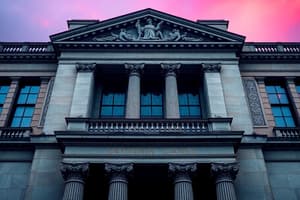Podcast
Questions and Answers
What is the primary role of a central bank in a country's economy?
What is the primary role of a central bank in a country's economy?
The primary role of a central bank is to regulate the banking sector, issue currency, and formulate monetary and fiscal policies to strengthen the national economy.
What distinguishes a central bank from commercial banks?
What distinguishes a central bank from commercial banks?
A central bank is fully owned and managed by the government and has the exclusive right to issue currency and regulate monetary policy, unlike commercial banks.
Name the central bank of Nepal and its establishment date.
Name the central bank of Nepal and its establishment date.
The central bank of Nepal is Nepal Rastra Bank, established on 14th Baisakh, 2013 B.S.
What is an essential function of a central bank regarding foreign exchange?
What is an essential function of a central bank regarding foreign exchange?
Identify one characteristic that is true of all central banks.
Identify one characteristic that is true of all central banks.
What was the first central bank established in the world, and when was it founded?
What was the first central bank established in the world, and when was it founded?
How does a central bank manage the cash and credit policy of a country?
How does a central bank manage the cash and credit policy of a country?
What does the Bank of England represent in the global context of central banks?
What does the Bank of England represent in the global context of central banks?
According to Dr. D. Kock, how can a central bank be defined?
According to Dr. D. Kock, how can a central bank be defined?
List two roles central banks play in relation to commercial banks.
List two roles central banks play in relation to commercial banks.
Flashcards are hidden until you start studying
Study Notes
Central Bank Overview
- Central banks are unique financial institutions that hold a central role in a country's monetary and banking sectors.
- They are fully owned and operated by the government, often referred to as the government's bank.
- Central banks formulate monetary and fiscal policies, regulating the entire banking sector.
Functions and Authority
- Central banks have the exclusive authority to issue currency and determine its value against foreign currencies.
- They manage cash and credit policies to bolster the national economy.
- These banks control foreign exchange and craft banking policies aimed at public welfare and economic development.
Structure and Characteristics
- Each country operates a single central bank, which centralizes financial governance.
- The Nepal Rastra Bank serves as the central bank of Nepal, established on 14th Baisakh, 2013 B.S., under the Nepal Rastra Bank Act, 2012 with an authorized capital of one crore.
Historical Context
- The first central bank in the world, the Riksbank of Sweden, was established in 1656.
- Other notable central banks include:
- Bank of England (established in 1694)
- Reserve Bank of India
- State Bank of Pakistan
- Federal Reserve Bank (USA)
- People's Bank of China
Definitions and Insights
- According to Dr. D. Kock, a central bank is defined as the apex institution within a nation's monetary and banking structure.
- The Dictionary of Banking and Finance describes the central bank as the main government-controlled bank that manages the country’s financial operations, including interest rates, currency issuance, and commercial bank supervision.
Studying That Suits You
Use AI to generate personalized quizzes and flashcards to suit your learning preferences.




